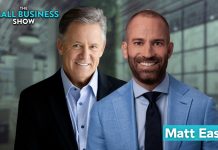Enthusiastic and committed employees are hard to find in Atlanta’s booming labor market. Today on the Atlanta Small Business Show to discuss some approaches for successful employee attraction and retention is Kevin Abel, co-founder of Abel Solutions and former Metro Atlanta Chamber of Commerce chairman of the Small Business Council. Kevin will be the keynote speaker at the TiECON conference 2018, taking place on September 28th.
TieCON Atlanta 2018 takes place Friday, September 28, 2018 at The Hotel at Avalon in Alpharetta. For more information and registration visit https://tieatlanta.org/
Use the promo code: ASBN to save $20 on your registration.
VIDEO TRANSCRIPTION
Jim Fitzpatrick: Hello, everyone. I’m Jim Fitzpatrick. Welcome into another edition of the Atlanta Small Business Show. Welcome to the Atlanta Small Business show, Kevin. So glad that you’re here.
Kevin Abel: Thanks Jim, it’s a pleasure to be here.
Jim Fitzpatrick: Sure. Tell us a little bit about what your company does.
Kevin Abel: Abel Solutions was founded back in 1994 by my wife Cindy and I. We started the company as a small consulting firm solving business problems, business solutions for medium and large companies here in the Atlanta area. The company grew over the course of the last 20 years or so.
Jim Fitzpatrick: Talk to us about what employee centric company culture does and why it’s important?
Kevin Abel: Well, let me start by talking about the company my wife Cindy, and I used to work for. I’m not going to mention names, because it was a great company and I owe all of our experience and growth professionally to them, in terms of what we brought to Abel Solutions. But it was difficult for a company like that to really have a core value people matter. Now, they did, but the company had tens of thousands of employees in countries across the world.
Kevin Abel: They brought us this idea that we were going to have a balance between self and community and family and work. They had these concentric circles that showed that we were going to have this work life balance. And it was a complete joke because it was not possible. Work was this circle, family was this circle, and self was this tiny stuff fraction-
Jim Fitzpatrick: Sounds like a religion rather than a company.
Kevin Abel: It’s business. When we started Abel Solutions my wife Cindy and I, she was pregnant with our first child. We were relative newlyweds just a few years [inaudible 00:02:07] and I said if we’re ever going to start our business, now’s the time and we did. And we said, we’re going to do it with an emphasis on work life balance. That was core as a value to us throughout the time that we run the company.
Jim Fitzpatrick: And the people that work for you. They obviously benefited from that from the outset.
Kevin Abel: Absolutely. It was something that we wanted from the company we worked for, and certainly wanted it for all our employees who worked for us.
Jim Fitzpatrick: Sure. What are more common reasons that … Or what are some of the common reasons that you see employee turnover among companies?
Kevin Abel: Well, it depends on the employee, and it depends on what their goals are in life. For some employees, depending on their station life and who they are, compensation is going to be key. There’s very little you can do to overcome someone who wants that higher salary and in the technology business which is what we were in, there’s always going to be better salaries. Those people just can’t be retained.
Kevin Abel: But there are other folks who are looking for something more something else and what they have in their work environment, in their career. But there’s going to be that culture, that environment that plays to what drives that person. It’s the work environment, it’s the way in which they get to make decisions and control their own outcomes and career growth. It’s the way in which they get to engage in community and fulfill some other aspects of what their goals are within the work environment. Those are the types of factors that having in your workplace can limit the attrition and have folks be more willing to stay within their current work environment.
Jim Fitzpatrick: It seems to me that it is very important in terms of the expectations of the associate as well as the company that those expectations are set on the outset of them coming aboard. So that you can share what those values are.
Kevin Abel: During the interview process, and during the recruiting process, of course, you’re selling those values of your company to the employee just like they’re selling their values or their resume to you. But it’s more than just during the recruitment phase. It’s like marketing, throughout your company’s lifecycle you’re marketing so that potential customers will be aware of you and can bring their business to you, or be receptive to your outreach. It’s the same thing with recruitment. It needs to be an ongoing marketing strategy to communicate to potential employees, to the employees here in Atlanta and beyond.
Jim Fitzpatrick: If your employees are happy with your company, they’re going to go out as disciples of your company and recruit other possible cabinets, right? To bring them into work. That’s a great-
Kevin Abel: Certainly. A happy employee is good for recruitment. It’s good for sales, it’s good for marketing, it’s good for all aspects of business.
Jim Fitzpatrick: Customer satisfaction plays into that as well. Happy employees make typically happy customers for that company, right?
Kevin Abel: Absolutely.
Jim Fitzpatrick: Yes. As a business owner, when did you know it was time to make your first hire? A lot of companies that are watching right now and entrepreneurs are saying, “We don’t know if we’re at that point yet. Can we afford a $30000, $40000, $90000 salary to bring someone on? Is there enough work for them? Can we afford it?”
Kevin Abel: It’s a great question. In any people business, in any consulting type business, that is always the biggest single challenge. Because normally a consulting business begins with the owner founder doing the consulting, bringing in the revenue, paying their own salary and needs. Making that first hire not only brings on a significant additional expense, but it reduces the workload and the compensation for that owner founder. I remember distinctly like it was yesterday sitting in the bagel place with that perspective, first employee sitting across from me. I didn’t know how to judge what fair compensation was, I didn’t know how to communicate benefits. We didn’t have a formal benefits plan. I didn’t know whether I have enough work for him for six weeks out after the project I was hiring her for was over. I didn’t understand how to talk about equity. I gave him 2% of the company right there verbally. 13 and a half years later, he was our longest serving employees. It was 13 and a half years later when he finally did leave Abel Solutions. He took a very nice check equivalent to 2% of equity of the company.
Jim Fitzpatrick: Wow, that’s pretty cool.
Kevin Abel: It was cool. It was a check I’d really enjoyed writing.
Jim Fitzpatrick: Looking back, do you think that you would have done that differently knowing what you know now about small businesses and opening them up and when to hire your first person? Because for the people that are watching now to say, “Whoa, he just said giving equity up on the first employee.” You don’t find that to be the case, right?”
Kevin Abel: Well, you got to put it in perspective in terms of time. And keep in mind this was 1997 and the dot com boom was underway. Everyone was talking about equity and making millions and gazillions of dollars in the technology industry. So, offering equity to early stage employees was almost a must in order to recruit that employees. So, no, I wouldn’t have done things differently. Maybe I would have been a little more careful about 2% just like that. Again, it was a check that I wrote 13 years later with great pleasure because it represented the growth that this first employee had done, and the commitment that he had given our company all this-
Jim Fitzpatrick: Probably, in large part, that’s why he was with you 13 and a half years. He was an equity partner in the deal, right?
Kevin Abel: It was that more the other factors we talked about earlier. That factored into retention for certain types of employees.
Jim Fitzpatrick: Yeah, for sure. Can you give us an idea of what we can expect from your keynote at the Atlanta’s TiECON this year?
Kevin Abel: Well, at Atlanta’s TiECON this year, my wife Cindy and I are going to be interviewed together by a legend in the Atlanta business community, Michael Cole’s. The founder of the Great American Cookie Company, CEO of Caribou Coffee, someone who I’ve known and respected for many years. He’s going to ask the questions, and we’ll see where the conversation goes. But I’m sure we’ll talk just like we did today about people and why they matter and what’s key.
Kevin Abel: I’ll tell you this, that this is a cliché, right? That it’s not about the destination, it’s about the journey. We all know that. When you start a small business, you are eager to go see, or at least visualize that pot of gold at the end of the rainbow. But what you find especially when you run a business as we did for more than 20 years, it really is the journey. The journey is so much caught up in the people that you touch along the way. We’re talking about employees, and we’re talking about vendors and customers and partners, people in all facets of the business you run.
Kevin Abel: The way in which you engage with them, the way in which you interact with them is part of the joy, the pleasure, the benefits of having your own opportunity to run a business. And that’s what I hope we’ll talk about more at that-
Jim Fitzpatrick: Sure. In saying that, and talking about that, it makes for the small business owner, the entrepreneur to enjoy their lives more along the way, right? Because they’re going to have pressures and they’re going to have potholes that that will show up, right? But if they’re enjoying each and every day, and growing their business, even through those challenging times, it makes for a big difference, doesn’t it?
Kevin Abel: Well, exactly. Look, when there’s an entrepreneur, there’s blessing and there’s curses. There’s Panic of making payroll, with finding the next customer, and there’s the benefit and the joy of being one’s own boss and making one’s own decisions and guiding one’s own path along the way. These are the opportunities of entrepreneurism. It’s not for everyone, but for those who have that instinct, who have that desire, who want to take on that challenge, the opportunities are wonderful. The life benefits are terrific.
Jim Fitzpatrick: Looking back 20 years, what are some of the things that you look back and say, “Wow, I wish I had never done that.” Any regrets or any mistakes that you can help other entrepreneurs say, “Make sure you think twice about this one.”
Kevin Abel: Look, there’s a difference between regrets and mistakes. I have no regrets, zero regrets. I’ve made many, many mistakes, too numerous to list out here. Let’s just say this, with every mistake, hopefully you learn a lesson. If you learn a lesson and make the appropriate adjustments, then it was a mistake worth making.
Jim Fitzpatrick: That’s right. That’s right. I guess would still be a mistake, but it would be one that as you said, you learn from. So, it goes into the asset column, right?”
Kevin Abel: That’s exactly it. The line I hear a lot today I didn’t hear back then was well, fail fast, fail often. Something like that. We had plenty of that along the way.
Jim Fitzpatrick: Get it out of the way, right? So you can learn and move on.
Kevin Abel: It’s the best way to learn.
Jim Fitzpatrick: Sure. Well, Kevin Abel, thank you so much for joining us on the Atlanta Small Business Show. We appreciate it. Hopefully we can have you back after the Atlanta TiECON Conference and talk a little bit more about things in the Atlanta market and what’s affecting small businesses.
Kevin Abel: It would be my pleasure. Thank you, Jim.
Jim Fitzpatrick: That’s great. Thanks.






